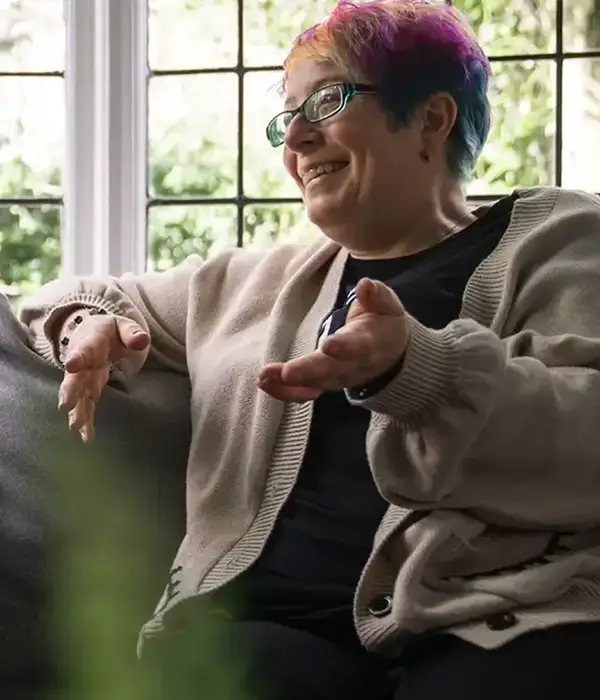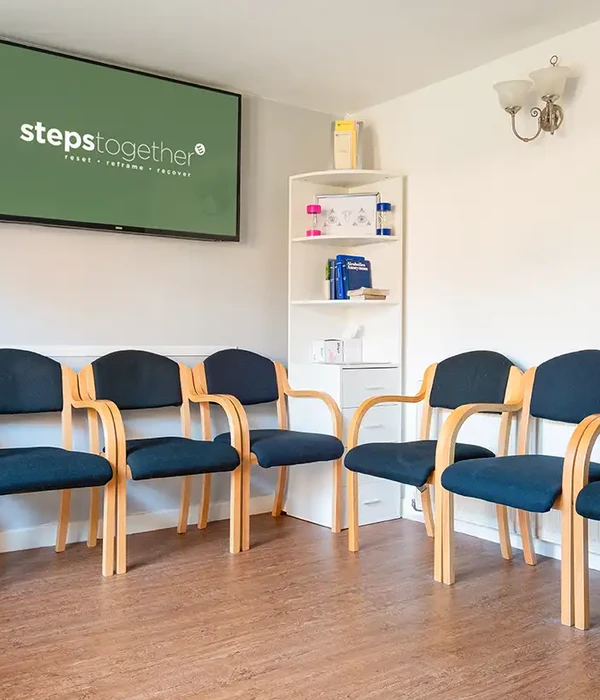Gaming Addiction Treatment
If you feel like playing video games is taking over your life or is harming your relationships, there are proven treatments that can help you regain control. Many people struggle to limit their gaming, and it’s normal to feel concerned if it starts affecting your day-to-day life and impacts your relationships with your friends and family.
Health professionals worldwide now recognise gaming addiction as a real condition. Gaming addiction treatment often includes talk therapy and practical advice to build healthier habits and routines.

Take the First Step Towards Recovery
Steps Together offers personalised support and proven treatments, providing the care, guidance and encouragement you need to move forward with confidence and build a healthier future.

Understanding Gaming Addiction
Gaming addiction, also known as gaming disorder, is recognised as a mental health condition that can affect people of various backgrounds and ages, though it tends to disproportionately affect young people.
It is most often linked to excessive use of video games or computer games, sometimes requiring professional treatment and support. This form of addiction is not just sitting in front of a computer for hours on end. Mobile games are also addictive.
Definition
Gaming addiction, or internet gaming disorder, is listed in the ICD-11 by the World Health Organisation. It shows patterns where your gaming habits become more important than other interests or daily activities.
According to the diagnostic criteria, you may experience a lack of control over how much you play, keep playing despite negative consequences, and often increase time spent on games.


Prevalence in Different Age Groups
Gaming addiction can affect children, teenagers, and adults, but it is most common in younger demographics. Research suggests young men are more likely to develop problems than other demographics.
School-aged children and teenagers may show symptoms such as dropping grades, mood swings, or social withdrawal. Adults, while less commonly affected, can also experience negative impacts on relationships, work, and health due to gaming.
Gaming Addiction Treatment Approaches
Professional help for gaming addiction usually involves more than one method. Early support, therapy, and long-term coping skills make recovery easier. The right gaming addiction treatment will depend on how video games affect your life and your mental health.
Cognitive Behavioural Therapy (CBT)
Cognitive behavioural therapy (CBT) is often the main approach for treating gaming addiction. CBT helps you identify unhelpful thought patterns (cognitive distortions) and behaviours related to gaming.
CBT teaches ways to manage triggers and urges to play games. Tools such as journals, goal charts, and self-monitoring checklists are often used. Regular sessions may help you replace game time with other hobbies.
Rehab Treatment for Gaming Addiction
If gaming addiction is severe or if you are struggling with other mental health problems, inpatient treatment may be needed. With inpatient treatment, you stay in a clinic or special unit where there is constant care and structure.
Outpatient treatment allows you to get help while continuing to live at home. You attend appointments at clinics or community health centres. Outpatient rehab often involves regular individual counselling, group therapy, and professional monitoring for lasting results.
Family Therapy and Support
Family therapy can help you and your family understand the effects of gaming addiction. In this setting, a therapist works with families to improve communication and set clear boundaries around gaming.
Sessions may include making a family plan for technology use and routines. Parents may learn skills for setting limits and giving feedback that supports recovery. Open discussions may help reduce arguments and blame at home.
Support Groups for Video Gaming
Support groups provide a safe space to talk with others who understand gaming addiction. These groups offer peer support, practical advice, and encouragement throughout the recovery process. You can share your experience, learn from others, and get advice on managing impulses.
Some groups meet in person while others meet online. Meetings are often led by people who have experienced recovery themselves. Common resources include workshops, helplines, and youth support centres.
Services that our multi-speciality addiction rehabilitation centres offer
Love and Relationship Addiction Treatment
Love and Relationship Addiction Treatment

Causes and Risk Factors
While playing video games is a risk factor for gaming addiction, not everyone who plays games will become addicted. There are many gamers who are able to set healthy limits on their playing time and control their behaviour.
As such, it’s important to understand why gaming addiction develops. This can help you spot the warning signs early. Several factors, such as psychological triggers, social influences, and the structure of online games, play a role in fostering addiction.
Psychological and Social Influences
If you use games to escape problems, feelings, or stress, you are at higher risk for gaming addiction. Many people turn to games to manage negative moods, such as sadness or anxiety. This escape offers short-term relief, but can lead to a pattern of avoiding real-life responsibilities.
Your environment, social circles, and family can all encourage or discourage gaming addiction. If your close friends spend a lot of time gaming, you are more likely to join in, which may lead to excessive play. Social isolation can make online games feel like your main way to connect with others.

Signs and Symptoms of Gaming Addiction
One of the clearest symptoms of video game addiction is that it starts to interfere with your everyday life. Often, your school, work, or home duties get neglected as you spend more time playing games. This can manifest as poor grades, missed deadlines, or neglected tasks at home.
If you’re struggling with gaming addiction, you may show big changes in behaviour and emotion. You may feel irritation or anger when you’re unable to play, especially if someone interrupts you or takes away your device.
When you try to cut down or stop gaming, you may feel withdrawal symptoms. These can include sadness, mood swings, or strong feelings of irritability. Some people become restless, anxious, or even depressed when they’re not able to play.
Effects of Video Game Addiction
Gaming addiction leads to serious issues affecting your thoughts, feelings, health, and everyday life. This form of addiction can have long-term effects on your mind, body, work, and studies.
Impact on Mental Health
You may notice changes in how you feel and think. Problem gaming is linked to a higher risk of depression and anxiety. Feeling tense or hopeless is common when you spend too much time gaming. It can increase stress and make it harder to cope with life’s problems.
Excessive gaming can also cause you to lose interest in things you once enjoyed. Over time, this can lead to feelings of loneliness as you become increasingly isolated. Studies have linked video game addiction to motivational control issues.
Physical Health Effects of Problematic Gaming
Physical health consequences resulting from gaming issues are often overlooked, yet they are just as important. Sitting and gaming for hours without breaks can cause back pain, headaches, and eye strain. Some people experience weight changes due to poor dietary habits, a sedentary lifestyle, and unhealthy food items marketed towards gamers.
Long hours of gaming can also affect your sleep. Staying up late to play games might lead to sleep deprivation and fatigue. Lack of sleep can weaken your immune system and make it harder to focus or remember things clearly.
Negative Consequences on Daily Life
Students can miss schoolwork, and adults might ignore work or social events. These habits can cause marks to drop or lead to a decline in work performance. Sometimes, you may even skip daily personal care, like showering or eating, due to a preoccupation with gaming activities.
Gaming addiction can also lead to financial problems if you spend money on in-game items or subscriptions instead of daily needs. This behaviour may get worse if it is not addressed early.

Get Help and Treat Gaming Addiction
Video games can be fun, and they are an incredibly profitable form of media in many cases. But some people may lose control over their gaming time, as many games are developed to be as engrossing as possible to encourage players to keep playing.
Our professional gaming addiction treatment programme can help you regain control of your behaviour if you’ve become addicted to gaming. As fun as gaming can be, you don’t have to let a behavioural addiction control your life.
Frequently Asked Questions
What are effective strategies for managing compulsive gaming behaviour?
You can set clear time limits for gaming, stick to a daily routine, and incorporate non-gaming activities, such as sports or homework. It helps to keep computers or consoles in shared spaces, making it easier for others to notice and address any changes. If you feel overwhelmed, professional support can guide you through more structured approaches.
What role does family support play in overcoming a gaming disorder?
Strong family support can significantly impact recovery. Families can help by setting clear boundaries, monitoring the time spent gaming, and planning other enjoyable group activities. Encouragement during difficult times and honest communication often improve your motivation.
How do lifestyle changes contribute to recovery from excessive video game play?
Regular exercise, time spent outdoors, and social activities outside gaming help you rebuild a balanced lifestyle. Eating well, getting enough sleep, and taking breaks from screens all support a healthy mind and body. Scheduling your time carefully makes it easier to avoid slipping into old habits.
Can behavioural therapy be successful in treating excessive gaming?
Behavioural therapy, such as cognitive behavioural therapy (CBT), can be effective in helping you change your gaming habits. These therapies focus on recognising triggers and learning new ways to cope with stress or boredom.
Are there any medications approved for treating gaming dependency?
No medication is specifically approved for treating gaming addiction. Some doctors may prescribe medicines for other conditions that often occur alongside gaming addiction, like depression or anxiety.
To what extent can gaming habits be considered pathological?
Playing games for long hours is not always an addiction. Gaming is considered a disorder when it causes significant problems in your daily life, such as missing school, neglecting friends and family, or experiencing anxiety when not playing.





